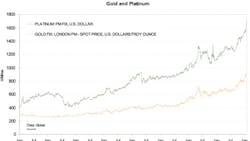It is easy to overlook the critical role gold plays in important manufacturing industries, but gold has many special technical attributes that mean it is the best, if not the only, material for certain practical applications. In recent years over 400 tons of gold has been used each year in vital industrial uses, about 12% of annual demand. In this article we will take a look at the use of gold in four key application areas: automotive pollution control, the electronics industry, in medicine and in emerging uses in nanotechnology.
The automotive industry is no stranger to precious metals. According to catalyst manufacturer Johnson Matthey, 4.24 million oz. (119 tons) of platinum was used in 2007 for automotive emissions control catalysts. Similar amounts of its sister metal palladium are used in this application too. This precious metal containing catalyst sits in the exhaust system of the vehicle, and through a reaction with the catalyst, the harmful gases of carbon monoxide, hydrocarbons and oxides of nitrogen are converted to the safe products carbon dioxide, water and nitrogen. Similarly, diesel engines have a diesel oxidation catalyst to remove pollutants which in this case includes particulate matter.
For gold, use by car manufacturers up to now has been limited to the on-board electronic items. These contain a small amount of gold which is critical to the reliable and efficient functioning of the microchips and contacts found in a car's ABS anti-lock braking system and safety air bags.
Replacing Platinum with Gold
Yet gold is currently around half the price of platinum. If a way could be found to at least partially replace platinum with some gold in automotive catalysts, huge potential cost savings could be realized by the industry. Following the announcement in 2007 by a silicon valley-based startup company called Nanostellar Inc, that it had developed a break-through diesel oxidation catalyst material that contains platinum, palladium and gold, it looks like that opportunity is now available on diesel engined vehicles.
Diesel engines have long been identified as major polluters, especially when compared to the gasoline engines and gas-electric hybrid vehicles. This is one of the major reasons why we don't see many diesel powered cars in the U.S., even though diesel engines have 20% to 30% better fuel efficiency than gasoline engines and better fuel efficiency than same-size gas-electric hybrids during highway driving. The implementation of 2007 diesel emissions control regulations in the U.S. promises to clean up diesel engines and has resulted in strong interest by automotive manufacturers to bring diesel cars to the U.S. On the other hand, 55% to 60% of European passenger vehicles are powered by modern, clean diesel engines.
A big cost concern in diesel emissions control remains the use of platinum. In recent years, the industry has introduced the use of palladium to partially replace the four-times more expensive platinum. Nanostellar claims that its material, called NS Gold, enables diesel engine manufacturers to reduce noxious emissions by 40% over platinum only products. This claim is important even with the recent increase in gold prices as platinum prices also continue to rise and the spread between platinum and gold prices continues to widen (see the illustration below).
The potential to use gold in this type of application has long been considered, but until now the technical challenges concerning catalyst durability have prevented gold's use. That is, the gold nanoparticles used in the catalyst tend to mould together when exposed to the elevated temperatures in the exhaust system. The result? The catalyst efficiency falls off dramatically. Nanostellar has a unique catalyst technology to prevent that process from occurring.
Rational Design
The interesting question is how a startup company with limited funds was able to leapfrog an industry that annually spends hundreds of millions of dollars on emissions research. Nanostellar believes the answer is a process called Rational Design. This method of working combines computational nanoscience and advanced synthetic chemistry to speed up the pace of development for nano-engineered materials. It is a dramatic departure from traditional materials research which is an empirically based trial-and-error method, consuming significant laboratory work and testing resources with no assurance of success.
Nanostellar is receiving endorsement from a wide range of important quarters. To begin with, acknowledging the transformational nature of this technology, The World Economic Forum recently selected Nanostellar as a 2008 Technology Pioneer and invited it to attend the 2008 annual meeting of the World Economic Forum in Davos, Switzerland. Previous Technology Pioneers have included Google and Napster. The gold mining industry has also backed the company's efforts. The World Gold Council, a marketing organisation funded by the world's leading gold mining companies has invested in Nanostellar joining other existing equity investors, which include 3i, Khosla Ventures and Monitor Ventures, among others. The Council is providing the company with significant marketing and business development support, designed to increase uptake of NS Gold by OEMs. Within the automotive industry Nanostellar has also received very positive encouragement and is currently pursuing the commercial application of the technology with a number of end-users.
With this encouraging support from investors, commentators and industry, the omens look good for Nanostellar and for gold's role in automotive emission control.
Richard Holliday is head of Industrial Applications for the World Gold Council. More information on the technical uses of gold can be found at www.utilisegold.com and on Nanostellar at www.nanostellar.com
